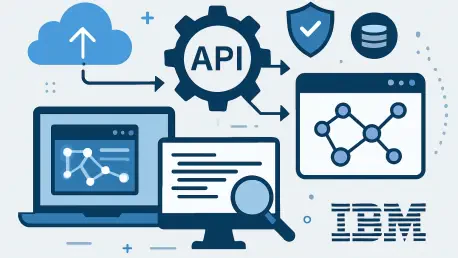In an era where digital transformation is no longer optional but essential, IBM has launched two transformative tools within its API Connect platform—the DataPower Nano Gateway and the API Developer Studio—to address the escalating demands of API management. These innovations arrive at a critical juncture as businesses grapple with an unprecedented surge in APIs, driven by the rapid adoption of generative AI and the complexities of hybrid and multicloud environments. Designed with a developer-first mindset, these solutions aim to empower developers, architects, and technology leaders by simplifying workflows, enhancing security, and ensuring scalability. By tackling the dual challenges of API proliferation and governance, IBM is setting a new standard for how enterprises can balance agility with control in a fast-evolving digital landscape. This strategic move not only underscores IBM’s commitment to innovation but also positions the company as a leader in navigating the intricate world of modern application development.
Addressing the API Explosion
The digital ecosystem is undergoing a seismic shift, with APIs emerging as the lifeblood of modern applications, connecting systems, and driving innovation across industries. However, this rapid growth comes with significant hurdles—managing an ever-increasing number of APIs across diverse environments often leads to operational bottlenecks, security vulnerabilities, and governance nightmares. Industry insights from leading analysts like Forrester and IDC highlight the pivotal role of robust API management platforms in mitigating these risks. IBM’s latest tools are crafted to directly confront this complexity, offering streamlined solutions that prioritize both efficiency and security. By embedding governance into the development process, these advancements ensure that enterprises can scale their API ecosystems without sacrificing oversight, providing a foundation for sustainable growth in an increasingly interconnected world.
Beyond the sheer volume of APIs, the challenge lies in harmonizing developer autonomy with enterprise-level policies. Many organizations struggle to provide developers with the freedom to innovate while maintaining consistent standards across hybrid and multicloud setups. IBM’s response is a carefully calibrated approach that empowers developers to work independently without compromising on organizational control. This balance is particularly crucial as businesses adopt more distributed architectures, where flexibility and scalability are non-negotiable. The focus on simplifying workflows means that developers can dedicate more energy to creating value rather than navigating cumbersome processes, while enterprises gain the assurance of built-in security measures. This dual emphasis addresses a core pain point in today’s API-driven landscape, paving the way for more agile and resilient operations.
Precision with DataPower Nano Gateway
One of IBM’s standout innovations is the DataPower Nano Gateway, a lightweight, cloud-native solution tailored for app-level API management. Unlike traditional gateways that often operate at a centralized level, this tool is designed to run alongside applications, enabling developers to oversee API traffic, enforce security protocols, and manage policies directly at the service boundary. Boasting a minimal footprint of just tens of megabytes and millisecond startup times, it is optimized for high-throughput, low-latency environments. Key features include JWT validation, data redaction, rate limiting, and integration with OpenTelemetry for standardized observability through logs, metrics, and traces. This gateway offers a fresh approach to handling modern workloads, ensuring that developers have the tools needed to maintain precision and agility in dynamic settings.
What truly distinguishes the DataPower Nano Gateway is its ability to deliver granular control and fault isolation at the individual API product level. By complementing IBM’s existing Federated and AI Gateways, it addresses the “noisy neighbor” problem often encountered in shared environments, where one service’s issues can impact others. This app-specific focus allows for auto-scaling and minimizes dependencies on centralized teams, fostering greater developer independence. Early feedback from preview users underscores its cloud-readiness and ease of use, particularly for protecting both monolithic and microservices architectures. Such capabilities make it an invaluable asset for organizations looking to enhance their API management strategies without introducing unnecessary complexity, ensuring that performance and security remain uncompromised even in the most demanding scenarios.
Transforming Workflows with API Developer Studio
Complementing the runtime precision of the Nano Gateway, the API Developer Studio introduces AI-powered efficiency into the API lifecycle, unifying creation, configuration, and testing within a single, code-centric platform. Accessible across web, desktop, and IDE plug-ins, this tool leverages agentic AI to accelerate tasks such as authoring and generating test cases, significantly reducing the time spent on repetitive processes. Its “everything as code” philosophy ensures seamless integration with CI/CD pipelines, supporting version control and enabling distributed teams to collaborate effectively. By embedding governance from the outset, the studio ensures that compliance and quality are maintained without slowing down development, offering a smarter way to manage API projects in today’s fast-paced environment.
The real strength of the API Developer Studio lies in its ability to minimize friction and enhance productivity through a cohesive user experience. Developers often face the challenge of context switching between disparate tools, which can lead to inefficiencies and errors. This studio eliminates such disruptions by consolidating essential tasks into one workflow, allowing teams to focus on innovation rather than logistics. Early adopters have lauded its flexibility and the unified authoring flow, noting how it simplifies managing projects as code while maintaining enterprise standards. Additionally, the AI-driven automation of policy enforcement reduces the cognitive load on developers, ensuring that best practices are followed without constant manual intervention. This tool represents a significant step forward in making API development not just faster, but also more reliable and aligned with organizational goals.
Building a Developer-First Future
The combined impact of the DataPower Nano Gateway and API Developer Studio reflects IBM’s broader vision of a developer-first, AI-enhanced approach to API management. These tools are not merely standalone solutions but integral components of a holistic strategy that bridges the gap between build and runtime phases. The Nano Gateway’s app-level precision pairs seamlessly with the Developer Studio’s AI-assisted workflows, creating a feedback loop that enhances both innovation and oversight. Their integration with IBM’s webMethods Hybrid Integration framework further ensures consistency across multicloud landscapes, addressing the scalability needs of modern enterprises. This unified approach positions IBM at the forefront of tackling API proliferation and the growing role of AI in development processes.
Looking ahead, the introduction of these tools marks a pivotal moment in redefining how enterprises navigate the complexities of digital ecosystems. As organizations continue to adopt hybrid architectures, the need for solutions that empower developers while maintaining governance will only intensify. The DataPower Nano Gateway and API Developer Studio provide a robust foundation for addressing these demands, offering actionable ways to streamline operations and enhance security. Enterprises are encouraged to explore these capabilities through live demonstrations with IBM’s team to fully grasp their potential. By embracing such innovations, businesses can better prepare for future challenges, ensuring that their API strategies remain agile, secure, and aligned with long-term objectives in an ever-evolving technological landscape.









